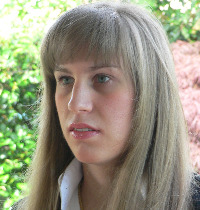
Giulia Giordano
|
|
Education |
|
Ph.D. in Industrial and Information Engineering: Automation (Excellent) M.Sc. in Electrical Engineering (Summa cum laude) B.Sc. in Electrical Engineering (Summa cum laude) ================================================================= Italian State Examination and Professional Qualification to practice as an ICT Engineer |
|
|
|
Academic career and teaching activities |
|
Associate Professor, Department of Industrial Engineering, University of Trento, Italy - and Visiting Professor and Delft Technology Fellow, DCSC, TU Delft. Previously: Assistant Professor (2017-2019), Delft Center for Systems and Control, Delft University of Technology, The Netherlands; also, since September 2018, Delft Technology Fellow. Postdoctoral Research Fellow (2016-2017), Department of Automatic Control and LCCC Linnaeus Center, Lund University, Sweden. Research Fellow (2016), Department of Mathematics and Computer Science, University of Udine, Italy, supported by PoCN Italian Grant for Industrial Innovation. Visiting PhD Researcher (2015), Institute of Systems Theory and Automatic Control, University of Stuttgart, Germany, supported by a competitive DAAD Scholarship. PhD Student (2013-2015), Department of Mathematics and Computer Science, University of Udine, Italy. Undergraduate Researcher (2012), Control and Dynamical Systems Group, Caltech (California Institute of Technology), USA, supported by a competitive SURF Fellowship. More information can be found in Giulia's Personal Website. ==== For all teaching activities, please see here. |
|
|
|
Research interests |
|
Systems and Control Theory, Network Theory and Systems Biology. Giulia's main research interests include the analysis and the control of dynamical networks, with applications especially to biology and epidemiology. More details here. |
|
|
|
Research work |
|
Giulia is the author or co-author of more than 100 contributions to international journals, books and international peer-reviewed conferences. Her research activities are interdisciplinary, at the edge between Systems and Control Theory, Mathematics, Engineering and Biology/Epidemiology. For a complete list of her publications, have a look at her Personal Website. |
|
|
|
Memberships in societies and scientific committees |
More information can be found in Giulia's Personal Website. |
|
|
|
Awards and honours |
|
Awards and Prizes
More details here. |
|
|
|
Conferences and lectures |
|
Organiser, session chair and (invited) speaker for the major international conferences in the systems-and-control field. Organiser/chair of workshops and invited/tutorial sessions. Plenary/keynote speaker at: Brazilian Congress of Automation, Fortaleza, 2022; ROCOND, Kyoto 2022; 19th International Conference on Computational Methods in Systems Biology, Bordeaux 2021; SIAM Conference on Control and Its Applications (CT21), 2021; opening of the National Congress of the Italian Society of Gynaecology and Obstetrics, 2020; 36th Annual Meeting of the European Society of Human Reproduction and Embryology (ESHRE), 2020; 3rd International Workshop on Control Engineering and Synthetic Biology, Oxford 2019. More information can be found in Giulia's Personal Website. |
|
|
|
Other work |
|
Intense reviewing activity for several international journals and conferences, in the fields of Systems and Control, Automation, Mathematics, Mathematical Biology, Systems and Synthetic Biology, and in interdisciplinary venues. Reviewer of grant proposals for ANR (Agence Nationale de la Recherche, French national research agency), FNRS (Fonds de la Recherche Scientifique, Belgian Research Council), and ERC (European Research Council). More information can be found in Giulia's Personal Website. |
|
|
|
Notes |
|
Languages
More information can be found in Giulia's Personal Website. |


